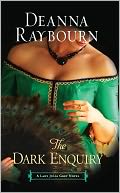The Dark Enquiry is the latest entry in Deanna Raybourn‘s Lady Julia Grey series. In this installment, Lady Julia and her husband, Nicholas Brisbane, have recently returned to London from both their honeymoon in the Mediterranean and an extended trip to India to solve a murder.
is the latest entry in Deanna Raybourn‘s Lady Julia Grey series. In this installment, Lady Julia and her husband, Nicholas Brisbane, have recently returned to London from both their honeymoon in the Mediterranean and an extended trip to India to solve a murder.
Solving murders together is nothing new for Brisbane and Lady Julia;they met when she hired him to solve the murder of her first husband. In fact, their entire courtship was conducted over a series of the recently and feloniously deceased.
But marriage, for better or for worse, is different than courtship. Upon returning to London, Brisbane returns to his business as a private enquiry agent. Lady Julia intends to be a full partner in his business. Brisbane, despite all previous evidence to the contrary, considering that Lady Julia has participated fully in every case he has been involved in since they met, keeps trying to find ways to “protect” her. His methods of protection unfortunately include lying to her for her purported own good. Lady Julia, who resents being coddled, starts leaving important details out of her accounts to her husband, in order to follow him around and determine what is being kept from her, especially as the case that Brisbane has taken on concerns her oldest brother.
Once the tale got past the marital discord, the real story finally got moving. And move it did. Initially, Brisbane seems to be investigating a fake spiritualist who was blackmailing Lady Julia’s oldest brother with some indiscreet letters he once wrote her. Unfortunately, the spiritualist turned out to be much more than a blackmailer. She was also a spy, and a spy in the service of more than one paymaster, at that. The only problem was that she was a dead spy. And between her blackmailing activities and her spying, the number of possible murderers seemed to be multiplying.
The second half of this book kept me riveted. The story flowed, the pace was fast, the plot kept twisting and turning. The setting in the early 1900s is also part of the appeal. Technology was just being adopted, so the telephone and the motorcar were new. Some people were willing to use the new tools, while others thought they were demonic. Being on the telephone, or not on it, made a big difference. Photography was new and exciting; the discoveries and art that could be made with it are fascinating. The spying is an important part of the story. The “Great Game” of European politics was going strong, leading up to World War I–this was a game that was about to be played for the biggest stakes of all.
The first half of the book really dragged for me. There was a need to show the marital adjustment, but it took much too long and was repetitive. Lady Julia and Brisbane didn’t just meet over a corpse, they kept meeting over dead bodies. Also, her family were known eccentrics. For him to expect her to be anything remotely like a conventional wife, or vice-versa, would have been out of character. I just wish it hadn’t taken half the book for them to give in to that fact.
